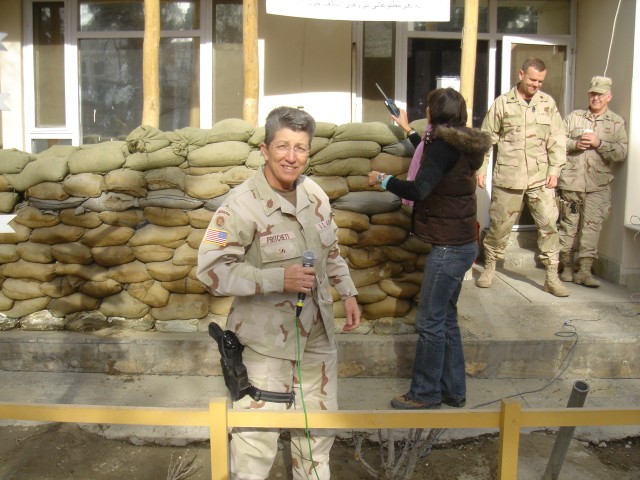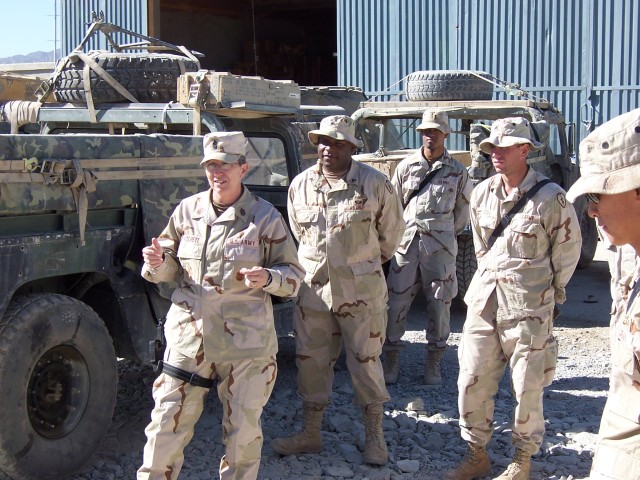From Oct. 20 through Nov. 14, the U.S. Army is honoring the achievements of its women warriors as part of a three-week "Celebration of Women in the Army." The commemoration coincides with the anniversary of the full integration of women into the Army 30 years ago with the disestablishment of the Women's Army Corps by former President Jimmy Carter.
WASHINGTON (Army News Service, Nov. 3, 2008) -- When Command Sgt. Maj. Cynthia Pritchett entered the service on July 2, 1973, it was into the Women's Army Corps and she recently shared her memories of what it was like to transition from an all-female force into an integrated Army.
"I never imagined in my wildest dreams that I would serve as the command sergeant major of a sub-unified command in a time of war," said Pritchett.
She served as the Army's first and only female command sergeant major of a sub-unified combatant command when selected by Lt. Gen. David Barno to be his principal enlisted advisor for Combined Forces Command-Afghanistan from May 9, 2004 to April 5, 2006.
She is currently the senior enlisted leader for U.S. Army Element, U.S. Central Command.
Pritchett, who enlisted five years before the WAC was integrated into the total Army, admits that the transition did not always run smoothly.
"It was bumpy at first," Pritchett said as she recalled a meeting with a company commander who wanted to know if she could handle the responsibility of "leading troops" prior to her assignment as a platoon sergeant at Fort Bragg, N.C.
"If I were a male, there would have been no interview," she said. "But over time I felt I was part of a team; I received the same opportunities as men."
Pritchett also said she believes one the biggest challenges the Army faced in the early days of integration was the ability of male soldiers to relate to their female counterparts and their overall ability to accept women in the Army.
"I'll admit I felt that I had to prove myself to my male counterparts; whereas a male Soldier with the same rank, experience, schooling, and assignments was accepted at face value until he messed up," she said. "This (perception) however has improved in the latter part of my career."
The deployments to Afghanistan and Iraq have shown just what female Soldiers are capable of, said Pritchett. "Now, everyone just wants the best person for the job, regardless of gender."
With today's 360-degree battlefield, she said the front line is not as easily defined as it was in past wars.
"Today, the enemy attacks supply lines and logistics convoys that have female truck drivers and MPs. Women aren't in combat arms (infantry, artillery, or armor units) but they're definitely in combat. I got shot at more than once, and I shot back," Pritchett said. "I don't think I am judged as being a female, but rather by my performance and what I bring to the fight."
Looking back, Pritchett believes the Women's Army Corps was a great catalyst to demonstrate the capability of women and opened many doors for female Soldiers.
Pritchett said her initial goals focused on a desire to one day become a drill sergeant and eventually a company first sergeant.
She would become a drill sergeant at the same Basic Training Company she attended at Fort McClellan, Ala.. And after nearly 15 years of service, she also served as an Army first sergeant.
"When I became a battalion sergeant major, I thought that would be it for me," said the former WAC.
Now one of the two most senior enlisted females in the Army, Pritchett has served under six three-star generals; surpassing her own expectations.
"The Army has been very good to me. This service is remarkable," the Concord, N.H., native said.
With 35 years of experience, Pritchett has earned numerous decorations and awards, including the Defense Superior Service Medal, three awards of the Legion of Merit, the Bronze Star Medal, three awards of the Meritorious Service Medal, five awards of the Army Commendation Medal, two awards of the Army Achievement Medal, and the Armed Forces Expeditionary Medal.
CSM Pritchett says the reason she has continued to serve in the Army is because she enjoys the camaraderie with Soldiers.
"I love that we are all working toward the defense of the nation. I love the people and what we stand for."
She believes that "when you show that you have the capability and you work hard and you stick with it, you are recognized for what you bring to the table and not because of your gender."
Although Pritchett does not believe she has fully broken the glass ceiling, she said that she has definitely put a "fine crack" in it and someday it is really going to break.
"We, as a service, have led the way in getting America to understand and accept diversity," she said.




Social Sharing